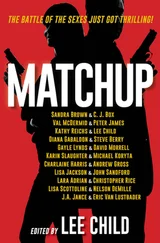“We never told them,” he said. “About the dynamite in the walls.”
“And we’re not going to,” Webster said quietly. “The old guy would freak out. He’s close to falling apart right now. I’m going to tell the Marines direct. They’re going in there. They’ll have to deal with it. Makes no difference if Johnson knows in advance or not.”
McGrath intercepted Johnson and Webster ran over to the armored vehicle. McGrath saw the Marine commander leaning down from the turret. Saw him nodding and grimacing as Webster spoke. Then the General’s aide fired up the Army Chevrolet. Johnson and Garber crammed into the front with him. McGrath jumped in back. Brogan and Milosevic crushed in alongside him.
Webster finished up and raced back to the Chevy. Squeezed in next to Milosevic. The LAV fired up its big diesel with a blast of black smoke. Then it crunched into gear and lumbered off north. The Chevy accelerated in its wake.
FOUR MILES NORTH, they crested a slight rise and entered a curve. Slowed and jammed to a stop in the lee of a craggy outcrop. The Marine commander vaulted down from the turret and ran north on the road. Webster and Johnson and McGrath got out and hurried after him. They paused together in the lee of the rock face and crept around the curve. Stared out and down into the ravine. It was an intimidating sight.
It ran left to right in front of them, more or less straight. And it was not just a trench. It was a trench and a step. The whole crust of the earth had fractured, and the southern plate had fallen below the level of the northern plate. Like adjacent sections of an old concrete highway, where a car thumps up an inch at the seam. Expanded to geological size, that inch was a fifty-foot disparity.
Where the earth had fractured and fallen, the edges had broken up into giant boulders. The scouring of the glaciers had tumbled those boulders south. The ice and the heave and the weather over a million years had raked out the fracture and turned it into a trench. It had cut back the rock plates to where they became solid again. Some places, it had carved a hundred-yard width. Other places, tougher seams of rock had kept the gap down to twenty yards.
Then the roots of a thousand generations of trees and the frozen water of the winters had eroded the edges until there was a steep ragged descent to the bottom and a steep ragged rise back up the northern side to the top, fifty feet higher than the starting point. There were stunted trees and tangled undergrowth and rock slides. The road itself was lifted progressively on concrete trestles and rose gently across a bridge. Then more concrete trestles set it down on the level ground to the north and it snaked away through the forest into the mountains.
But the bridge was blown. Charges had been exploded against the two center trestles. A twenty-foot section of the center span had fallen a hundred feet into the trench. The four men in the lee of the outcrop could see fragments of the road lying shattered in the bottom of the ravine.
“What do you think?” Johnson asked urgently.
The Marine commander was giving it a fast sweep through his field glasses. Left and right, up and down, examining the exact terrain.
“I think it’s shit, sir,” he said.
“Can you get through?” Johnson asked him.
The guy lowered his field glasses and shook his head.
“Not a hope in hell,” he said.
He stepped across shoulder to shoulder with the General, so Johnson could share the same line of sight. Started talking rapidly and pointing as he did so.
“We could get down to the bottom,” he said. “We could go in right there, where the rock slide gives us a reasonable descent. But getting up the other side is the problem, sir. The LAV can’t climb much more than forty-five degrees. Most of the north face looks a lot steeper than that. Some places, it’s near enough vertical. Any gentle slopes are overgrown. And they’ve felled trees. See there, sir?”
He pointed to a wooded area on the slope opposite. Trees had been felled and left lying with their chopped ends facing south.
“Abatises,” the Marine said. “The vehicle is going to stall against them. No doubt about that. Coming uphill, slowly, those things would stop a tank. We go in there, we’ll be trapped in the ditch, no doubt at all.”
“So what the hell do we do?” Johnson said.
The Marine officer shrugged.
“Bring me some engineers,” he said. “The gap they blew is only about twenty feet wide. We can bridge that.”
“How long will that take?” Webster asked.
The Marine shrugged again.
“All the way up here?” he said. “Six hours? Maybe eight?”
“Way too long,” Webster said.
Then the radio receiver in McGrath’s pocket started crackling.
REACHER WAS HIDING out in the woods. Worried about the dogs. They were the only thing he wasn’t certain about. People, he could handle. Dogs, he had very little experience.
He was in the trees, north of the Bastion, south of the rifle range. He had heard the Chinook hit the ground from a mile away. It hit tail first, smashing and tearing into the wooded slope. It looked to have slipped sideways in the air and missed the courthouse by two hundred yards. No explosions. Not from the courthouse or from the chopper itself. No sound of fuel tanks going up. Reacher was reasonably optimistic for the crew. He figured the trees and the collapse of the big boxy body might have cushioned the impact for them. He had known chopper crews survive worse.
He had an M-16 rifle in his hand and a Glock in his pocket. The Glock was fully loaded. Seventeen shells. The M-16 had the short clip. Twenty shells, less the one that had killed the guy with the missile. The second M-16 had the long clip. A full load of thirty. But it was hidden in the trees. Because Reacher had a rule: choose the weapon you know for certain is in working order.
He felt instinctively that the focus of attention would be in the southeast direction. That was where Holly was being held, and that was where the Chinook had come down. That was where the opposition forces would be massing. He felt people would be turning to face southeast, apprehensively, staring down into the rest of the United States, waiting. So he turned his back and headed northwest.
He moved cautiously. The bulk of the enemy was elsewhere, but he knew there were squads out looking for him. He knew they had already discovered Fowler’s body. He had seen two separate patrols, searching the woods. Six men in each, heavily armed, crashing through the undergrowth, searching. Not difficult to avoid. But the dogs would be difficult to avoid. That was why he was worried. That was why he was moving cautiously.
He stayed in the trees and skirted the western end of the rifle range. Tracked back east around the parade ground. Fifty yards north, he turned again and paralleled the road up to the mines. He stayed in the trees and moved at a fast jog. Used the time to start laying out some priorities. And a timescale. He figured he had maybe three hours. Bringing down the Chinook was going to provoke some kind of a violent reaction. No doubt about that. But in all his years in the service, he had never known anything to happen faster than three hours. So he had three hours, and a lot of ground to cover.
He slowed to a fast walk when the rocky ground started rising under his feet. Followed a wide uphill circle west and cut straight in to the edge of the bowl where the mine entrances were. He heard diesel engines idling. He bent double and crept across to the cover of a rock. Looked out and down.
He was just above halfway up the slope surrounding the bowl. Looking more or less due east across its diameter. The log doors of the farther shed were standing open. Four of the missile unit’s trucks were standing on the shale. The four with the weapon racks in back. The troop carrier was still inside.
Читать дальше












